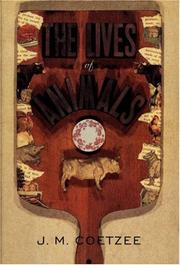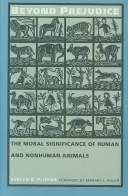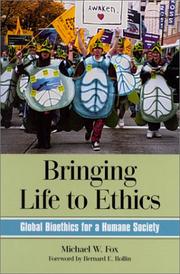| Listing 1 - 10 of 40 | << page >> |
Sort by
|
Book
ISBN: 1108356222 1108359582 1108354882 1108420613 1108430686 Year: 2017 Publisher: Cambridge : Cambridge University Press,
Abstract | Keywords | Export | Availability | Bookmark
 Loading...
Loading...Choose an application
- Reference Manager
- EndNote
- RefWorks (Direct export to RefWorks)
The use of animals in research has always been surrounded by ethical controversy. This book provides an overview of the central ethical issues focusing on the interconnectedness of science, law and ethics. It aims to make theoretical ethical reasoning understandable to non-ethicists and provide tools to improve ethical decision making on animal research. It focuses on good scientific practice, the 3Rs (replacement, reduction and refinement), ethical theories applied to specific cases and an overview of regulatory issues. The book is co-authored by experts in animal research, animal welfare, social sciences, law and ethics, and provides both animal researchers and members of animal ethics committees with knowledge that can facilitate their work and communication with stakeholders and the public. The book is written to provide knowledge, not to argue a certain position, and is intended to be used in training that aims to fulfil EU Directive 2010/63/EU.
Animal rights. --- Animal liberation --- Animals' rights --- Rights of animals --- Animal welfare --- Moral and ethical aspects

ISBN: 0691004439 Year: 1999 Publisher: Princeton : Princeton University Press,
Abstract | Keywords | Export | Availability | Bookmark
 Loading...
Loading...Choose an application
- Reference Manager
- EndNote
- RefWorks (Direct export to RefWorks)
Animal rights --- Animal welfare --- Animal liberation --- Animals' rights --- Rights of animals --- Philosophy --- Moral and ethical aspects --- 870 --- proza --- prose
Book
ISBN: 9781108986304 9781108833684 9781108986571 Year: 2021 Publisher: Cambridge Cambridge University Press
Abstract | Keywords | Export | Availability | Bookmark
 Loading...
Loading...Choose an application
- Reference Manager
- EndNote
- RefWorks (Direct export to RefWorks)
In this comprehensive updated introduction to animal ethics, Lori Gruen weaves together poignant and provocative case studies with discussions of ethical theory, urging readers to engage critically and reflect empathetically on our relationships with other animals. In clear and accessible language, Gruen discusses a range of issues central to human-animal relations and offers a reasoned new perspective on key debates in the field. She analyses and explains a range of theoretical positions and poses challenging questions that directly encourage readers to hone their ethical reasoning skills and to develop a defensible position about their own practices. Her book will be an invaluable resource for students in a wide range of disciplines including ethics, environmental studies, veterinary science, gender studies, and the emerging field of animal studies. The book is an engaging account of animal ethics for readers with no prior background in philosophy.
Animal welfare --- Animal rights. --- Moral and ethical aspects. --- Animal liberation --- Animals' rights --- Rights of animals --- Moral and ethical aspects
Book
ISBN: 1529204380 1529204356 1529204364 1529204348 9781529204384 9781529204360 9781529204353 9781529204346 9781529204391 Year: 2021 Publisher: Bristol Bristol University Press
Abstract | Keywords | Export | Availability | Bookmark
 Loading...
Loading...Choose an application
- Reference Manager
- EndNote
- RefWorks (Direct export to RefWorks)
This illuminating study explores crimes against, and involving, wildlife and the resultant social harms. The authors go well beyond basic conceptions of animal-related crime, such as illicit trade, for a deeper exploration of wildlife criminology, using a novel approach that combines philosophical, legal and criminological perspectives. They shed light on both legal and illegal harms, including blood sports, wildlife as food and abuse in zoos, and consider the potential connections with inter-human crimes. This is a unique treatment of wildlife as victims of crime and a consideration of their rights as sentient beings that sets new horizons for the concept of wildlife criminology.
Wildlife crimes. --- Crimes against nature (Wildlife crimes) --- Crime --- Animal rights. --- Animal liberation --- Animals' rights --- Rights of animals --- Animal welfare --- Moral and ethical aspects
Book
ISBN: 9780199351978 9780195371963 0195371968 019935197X Year: 2011 Publisher: New York, N.Y. Oxford University Press
Abstract | Keywords | Export | Availability | Bookmark
 Loading...
Loading...Choose an application
- Reference Manager
- EndNote
- RefWorks (Direct export to RefWorks)
Ethics --- Animal welfare --- Animal rights. --- Animal rights --- Animal liberation --- Animals' rights --- Rights of animals --- Moral and ethical aspects --- General ethics --- Moral and ethical aspects. --- Animaux --- Droits --- Protection --- Droits. --- Protection. --- veterinary

ISBN: 082231648X 0822396041 082231634X 1322221057 9780822316480 Year: 1995 Publisher: Durham : Duke University Press,
Abstract | Keywords | Export | Availability | Bookmark
 Loading...
Loading...Choose an application
- Reference Manager
- EndNote
- RefWorks (Direct export to RefWorks)
In Beyond Prejudice, Evelyn B. Pluhar defends the view that any sentient conative being—one capable of caring about what happens to him or herself—is morally significant, a view that supports the moral status and rights of many nonhuman animals. Confronting traditional and contemporary philosophical arguments, she offers in clear and accessible fashion a thorough examination of theories of moral significance while decisively demonstrating the flaws in the arguments of those who would avoid attributing moral rights to nonhumans.Exposing the traditional view—which restricts the moral realm to autonomous, fully fledged "persons"—as having horrific implications for the treatment of many humans, Pluhar goes on to argue positively that sentient individuals of any species are no less morally significant than the most automomous human. Her position provides the ultimate justification that is missing from previous defenses of the moral status of nonhuman animals. In the process of advancing her position, Pluhar discusses the implications of determining moral significance for children and "abnormal" humans as well as its relevance to population policies, the raising of animals for food or product testing, decisions on hunting and euthanasia, and the treatment of companion animals. In addition, the author scrutinizes recent assertions by environmental ethicists that all living things or that natural objects and ecosystems be considered highly morally significant. This powerful book of moral theory challenges all defenders of the moral status quo—which decrees that animals decidedly do not count—to reevaluate their convictions.
Animal rights. --- Human rights. --- Philosophical anthropology. --- Anthropology, Philosophical --- Man (Philosophy) --- Civilization --- Life --- Ontology --- Humanism --- Persons --- Philosophy of mind --- Basic rights --- Civil rights (International law) --- Human rights --- Rights, Human --- Rights of man --- Human security --- Transitional justice --- Truth commissions --- Animal liberation --- Animals' rights --- Rights of animals --- Animal welfare --- Philosophy --- Law and legislation --- Moral and ethical aspects

ISBN: 0791448010 0791448029 9780791448014 9780791448021 Year: 2001 Publisher: Albany, NY : State University of New York [SUNY] Press,
Abstract | Keywords | Export | Availability | Bookmark
 Loading...
Loading...Choose an application
- Reference Manager
- EndNote
- RefWorks (Direct export to RefWorks)
Bioethics --- Environmental ethics --- Animal rights --- Animal rights. --- Bioethics. --- Environmental ethics. --- bio-ethiek (medische, biomedische ethiek, bio-ethische aspecten) --- global bioethics --- milieuethiek --- biotechnologie --- bioéthique (éthique médicale, biomédicale, aspects bioéthiques) --- éthique de l'environnement --- Environmental quality --- Human ecology --- Biology --- Biomedical ethics --- Life sciences --- Life sciences ethics --- Animal liberation --- Animals' rights --- Rights of animals --- Moral and ethical aspects --- Ethics --- Science --- Animal welfare --- Animal Rights. --- Animal Rights
Book
ISBN: 9782750902759 2750902754 Year: 2007 Publisher: Paris : Presses de la Renaissance,
Abstract | Keywords | Export | Availability | Bookmark
 Loading...
Loading...Choose an application
- Reference Manager
- EndNote
- RefWorks (Direct export to RefWorks)
Human-animal relationships --- Animal rights --- Animals (Philosophy) --- Philosophy - Man and Animals - Behavior - Interviews --- 1 --- BPB0711 --- Filosofie. Psychologie --- 1 Filosofie. Psychologie --- Animal-human relationships --- Animal-man relationships --- Animals and humans --- Human beings and animals --- Man-animal relationships --- Relationships, Human-animal --- Animals --- Philosophy --- Animal liberation --- Animals' rights --- Rights of animals --- Animal welfare --- Moral and ethical aspects --- 1 Philosophy. Psychology --- Philosophy. Psychology --- Animal Rights. --- Animal Rights
Book
ISBN: 081911488X Year: 1981 Publisher: Berkeley : University of California Press,
Abstract | Keywords | Export | Availability | Bookmark
 Loading...
Loading...Choose an application
- Reference Manager
- EndNote
- RefWorks (Direct export to RefWorks)
Animals. --- Bioethics. --- Animal rights --- -Animals --- -Animal kingdom --- Beasts --- Fauna --- Native animals --- Native fauna --- Wild animals --- Wildlife --- Organisms --- Human-animal relationships --- Zoology --- Animal liberation --- Animals' rights --- Rights of animals --- Animal welfare --- Biomedical Ethics --- Health Care Ethics --- Ethics, Biomedical --- Ethics, Health Care --- Ethics, Medical --- Ethicists --- Animalia --- Animal --- Metazoa --- Bibliography --- Moral and ethical aspects --- -Bibliography --- Animals --- Bioethics --- Animal kingdom
Book
ISBN: 9783770561100 3770561104 3846761109 9783846761106 Year: 2017 Publisher: Paderborn : Wilhelm Fink, Brill Deutschland,
Abstract | Keywords | Export | Availability | Bookmark
 Loading...
Loading...Choose an application
- Reference Manager
- EndNote
- RefWorks (Direct export to RefWorks)
Kann eine Analogisierung von animalischen und sozio-politischen Ordnungen funktionieren? Auf welche Art und Weise fungieren Tiere als Medium der Darstellung und Reflexion politischer Ordnungen? In Hinblick auf diese Fragen wird insbesondere das Verhältnis zwischen Tieren und menschlicher Kollektivität in den Vordergrund gerückt und diskutiert. Diese Relation tritt in mindestens drei Erscheinungsformen zutage – erstens: als Kontrastrelation, als politisches Ausschlussprinzip, wie in den traditionellen Interpretationen des »zoon politikon«; zweitens: als Korrespondenzrelation, als Analogisierung animalischer und sozio-politischer Ordnungen; drittens: als Äquivalenzrelation, als Interaktion, als Beziehung zwischen Mensch und Tier, die selbst politisch ist.
Relations homme-animal --- Comportement humain --- Modèles animaux --- Relations homme-animal. --- Modèles animaux. --- Human-animal relationships --- Animal rights --- Political science --- Animal liberation --- Animals' rights --- Rights of animals --- Animal welfare --- Animal-human relationships --- Animal-man relationships --- Animals and humans --- Human beings and animals --- Man-animal relationships --- Relationships, Human-animal --- Animals --- Congresses. --- Philosophy --- Moral and ethical aspects
| Listing 1 - 10 of 40 | << page >> |
Sort by
|

 Search
Search Feedback
Feedback About UniCat
About UniCat  Help
Help News
News